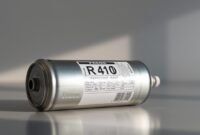Air conditioners are essential in many homes, providing relief from the heat and ensuring a comfortable living environment. However, when a vinegar-like odor accompanies that familiar hum, it can be both puzzling and concerning. This guide explores the causes, dangers, and solutions for when your AC smells like vinegar.
Is an AC Smells Like Vinegar Dangerous?
Yes, a vinegar-like odor from your air conditioner can be a potential health concern. This smell often indicates the growth of mold and bacteria within the unit. If the AC doesn’t expel water efficiently, mold or mildew can develop, releasing spores into the air that can be harmful when inhaled.
Read also: Can Humidifiers Cause Mold? Here’s Why
Additionally, some AC units with electric motors can emit ozone, a compound with a pungent smell that introduces toxins into the air.
What Causes the Vinegar Odor?
The sudden onset of a vinegar-like odor from your air conditioner indicates specific issues within the system. Here are the primary causes:
Mold and Bacteria Growth
When an AC unit fails to expel water efficiently, it creates a damp environment conducive to mold and mildew growth. Certain mold types emit a scent similar to vinegar, making it a noticeable concern. The real danger lies in the mold spores dispersed into the air, posing health risks, especially to young children and individuals with respiratory conditions.

Emissions from Electric Motors
Some air conditioners, especially those with electric motors, may produce ozone. Ozone, an inorganic molecule of three oxygen atoms, arises from using electricity to generate energy. Not only does ozone have a distinctively pungent smell, but it also releases toxins harmful to inhalation.
Excess Condensation
The cooling coils in an AC unit are responsible for adjusting the air temperature. As air passes over these cold coils, it cools down, leading to condensation. Typically, this condensation is collected and drained. However, excessive condensation can occur in highly humid conditions, causing the coils to emit a vinegar-like odor.
Malfunctioning Filters
The air filter is crucial, ensuring the air circulated is clean and free from contaminants. A broken or malfunctioning filter can release mold and other toxins, contributing to the vinegar scent.
Clogged Condensation Pan
The condensation pan collects excess water from the AC unit. This pan can become clogged in environments with a lot of dust or particles, such as warehouses. A clogged pan can lead to water stagnation, promoting mold growth and the associated vinegar smell.
Read also: What Temperature to Set Air Conditioner in Winter?
How to Resolve and Prevent the Vinegar Scent in AC Units
Finding practical solutions and preventive measures is paramount for your home’s long-term comfort and safety. Here are some effective steps:
Clean or Replace the Air Filter
Over time, air filters can become clogged or malfunction, leading to the release of unwanted odors. Regularly checking, cleaning, or replacing the air filter can significantly reduce the chances of a vinegar scent.
Address Moisture Issues
Excess moisture within the AC unit can lead to mold growth, a primary culprit behind the vinegar odor. To tackle this, open up the AC unit and dry it out thoroughly. Using absorbent cloths or paper towels can help in soaking up the moisture.
Thoroughly Clean the Vents
Mold or mildew might lurk in the vents, contributing to the unpleasant smell. A comprehensive cleaning of the vents can help in eliminating this issue. Using a brush can aid in reaching the nooks and crannies where mold might hide.
An anti-bacterial cleaning agent or a solution of bleach mixed with water is recommended for effective cleaning. It removes the mold and disinfects the area, preventing future growth.
Unclog the Condensation Pan
Regularly check and clean the condensation pan to ensure it’s not clogged. Removing any standing water and disinfecting the pan can prevent mold growth.
Unclog Drain Lines
Ensure that the drain lines are free from blockages. This allows excess water to be expelled efficiently, reducing the risk of mold growth.
Use a Dehumidifier
Using a dehumidifier in areas with high humidity can help reduce the moisture level, preventing mold growth within the AC unit.
Importance of Regular Maintenance
Regular AC unit maintenance is crucial for preventing odors and ensuring efficient operation. Schedule periodic check-ups with a professional technician to identify and address potential issues before they become severe.
Table: Causes and Solutions for Vinegar Smell in AC
| Cause | Description | Solution |
|---|---|---|
| Mold and Bacteria Growth | Mold growth due to damp conditions | Clean and dry the unit, replace the air filter |
| Emissions from Motors | Ozone production from electric motors | Ensure proper ventilation, use air purifiers |
| Excess Condensation | High humidity causing excessive condensation | Use a dehumidifier, unclog drain lines |
| Malfunctioning Filters | High humidity causes excessive condensation | Regularly clean or replace air filters |
| Clogged Condensation Pan | Broken or dirty air filters release mold and toxins | Clean and disinfect the condensation pan |
Conclusion
Is an AC that smells like vinegar dangerous? Absolutely. Addressing this issue is crucial to ensure the health and safety of your household. By understanding the root causes and implementing the solutions provided, you can enjoy a cool, refreshing, and odor-free environment in your home. Regular maintenance and prompt attention to unusual odors will help keep your AC unit running efficiently and safely.
For more information on maintaining your AC unit and preventing odors, consider consulting with HVAC professionals who can provide expert advice and services tailored to your needs.


